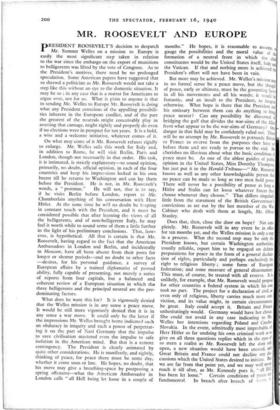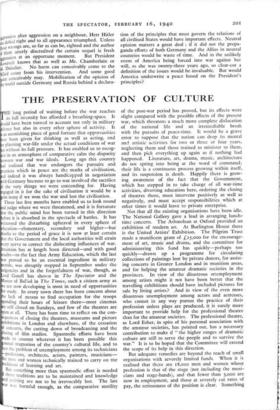MR. ROOSEVELT AND EUROPE
PRESIDENT ROOSEVELT'S decision to despatch Mr. Sumner Welles on a mission to Europe is easily the most significant step taken in relation to the war since the embargo on the export of munitions to belligerents was lifted by the vote of Congress. As to the President's motives, there need be no prolonged speculation. Some American papers have suggested that so shrewd a politician as Mr. Roosevelt would not take a step like this without an eye to the domestic situation. It may be so ; in any case that is a matter for Americans to argue over, not for us. What is plain to anyone is that in sending Mr. Welles to Europe Mr. Roosevelt is doing what any President conscious of the appalling possibili- ties inherent in the European conflict, and of the part the greatest of the neutrals might conceivably play in averting that carnage, might rightly and properly do even if no elections were in prospect for ten years. It is a bold, a wise and a welcome initiative, whatever comes of it.
On what may come of it Mr. Roosevelt refuses rigidly to enlarge. Mr. Welles sails this week for Italy and, in addition to Rome, he will visit Berlin, Paris and London, though not necessarily in that order. His task, it is intimated, is strictly explanatory—to sound opinion, primarily, no doubt, official opinion, in each of the four countries and keep his impressions locked in his own breast till he returns to Washington and can lay them before the President. He is not, in Mr. Roosevelt's words, a " postman." He will not, that is to say, if he visits Berlin before London, report to Mr. Chamberlain anything of his conversation with Herr Hitler. At the same time he will no doubt be keeping in constant touch with the President, and it must be considered possible that after learning the views of all the belligerents, and of non-belligerent Italy, he may feel it worth while to sound some of them a little further in the light of his preliminary conclusions. That, how- ever, is hypothetical. All that is certain is that Mr. Roosevelt, having regard to the fact that the American Ambassadors in London and Berlin, and incidentally in Moscow, have all been absent from their posts for longer or shorter periods—and no doubt to other facts —desires, for his personal guidance, a survey of European affairs by a trained diplomatist of proved ability, fully capable of presenting, not merely a series of reports from four capitals, but a balanced and coherent review of a European situation in which the three belligerents and the principal neutral are the pre- dominating factors.
What does he want this for? It is vigorously denied that the Welles mission is in any sense a peace move. It would be still more vigorously denied that it is in any sense a war move. It could only be the latter if the impressions Mr. Welles brought home indicated such an obduracy in iniquity and such a power of perpetrat- ing it on the part of Nazi Germany that the impulse to save civilisation mastered even the impulse to safe isolation in the American mind. But that is a remote contingency. The President is clearly animated by quite other considerations. He is manifestly, and rightly, thinking of peace, for peace there must be some day, whether it come soon or late. He hopes, no doubt, that his move may give a breathing-space by postponing a spring offensive—what the American Ambassador in London calls " all Hell being let loose in a couple of months." He hopes, it is reasonable to assume, to gauge the possibilities and the moral value of the formation of a neutral front in which the chief constituents would be the United States itself, Italy a the Vatican. If that and nothing more is achieved the President's effort will not have been in vain.
But more may be achieved. Mr. Welles's mission may in no formal sense be a peace move, but the though of peace, early or ultimate, must be the governing factor in all his movements and all his words; it would he fantastic, and an insult to the President, to imagine otherwise. What hope is there that the President and his emissary between them can do anything to bring peace nearer? Can any possibility be discerned of bridging the gulf that divides the war-aims of the Allies from what appear to be the war-aims of Germany? One danger in that field may be confidently ruled out. There will be no attempt by Mr. Roosevelt to persuade Britain or France to swerve from the purposes they have set before them and are ready to pursue to the end. He cherishes no illusions about what the basic conditions of peace must be. As one of the ablest guides of public opinion in the United States, Miss Dorothy Thompson, has just put it in the Herald-Tribune—" Mr. Roosevelt knows as well as any other knowledgeable person that no peace can be made so long as two men hold power. There will never be a possibility of peace as long as Hitler and Stalin can let loose whatever forces they choose whenever they choose." That differs singularly little from the statement of the British Government's convictions as set out by the last member of the Was Cabinet who dealt with them at length, Mr. Oliver Stanley.
Does that, then, close the door on hope? Not coin pletely. Mr. Roosevelt will in any event be in office for ten months yet, and the Welles mission is only a step in a process. What the second step may be only the President knows, but certain Washington authorities, usually reliable, report him to be engaged on definite preparations for peace in the form of a general declara- tion of rights, particularly and perhaps exclusively the right to religious liberty ; some form of European federation; and some measure of general disarmament. This must, of course, be treated with all reserve. It Is unlikely, for example,. that Mr. Roosevelt would propose for other countries a federal system in which his .own took no part. The project for a declaration of civil, or even only of religious, liberty carries much more con• viction, and its value might, in certain circumstances, be great. Italy could accept it. Britain and France unhesitatingly would. Germany would have her choice. She could not avoid in any case indicating to illy Welles her intentions regarding Poland and Czeello- Slovakia. In the event, admittedly most improbable, of Herr Hitler so far undoing his own criminal work as to give on all three questions replies which in the eyes of so stern a realist as Mr. Roosevelt left the door oil open, a new situation would have been created, and Great Britain and France could not decline any ti's' cussions which the United States desired to initiate. But we are far from that point yet, and we may well necel,, reach it till after, as Mr. Kennedy puts it, " all Ho! has been let loose." Certain conditions of peace ar.. fundamental. In breach after breach of mltv. ression after aggression on a neighbour, Herr Hitler defied right and to all appearance triumphed. Unless ose wrongs are, so far as can be, righted and the author them utterly discredited the certain sequel is fresh ession at an opportune moment. But President oosevelt knows that as well as Mr. Chamberlain or Daladier. No harm can conceivably come to the ed cause from his intervention. And some good *te conceivably may. Mobilisation of the opinion of e world outside Germany and Russia behind a declara- tion of the principles that must govern the relations of all civilised States would have important effects. Neutral opinion matters a great deal ; if it did not the propa- ganda efforts of both Germany and the Allies in neutral countries would be waste of time. And in the unlikely event of America being forced into war against her will, as she was twenty-three years ago, so clear-cut a definition of the issues would be invaluable. But would America underwrite a peace based on the President's principles?







































 Previous page
Previous page